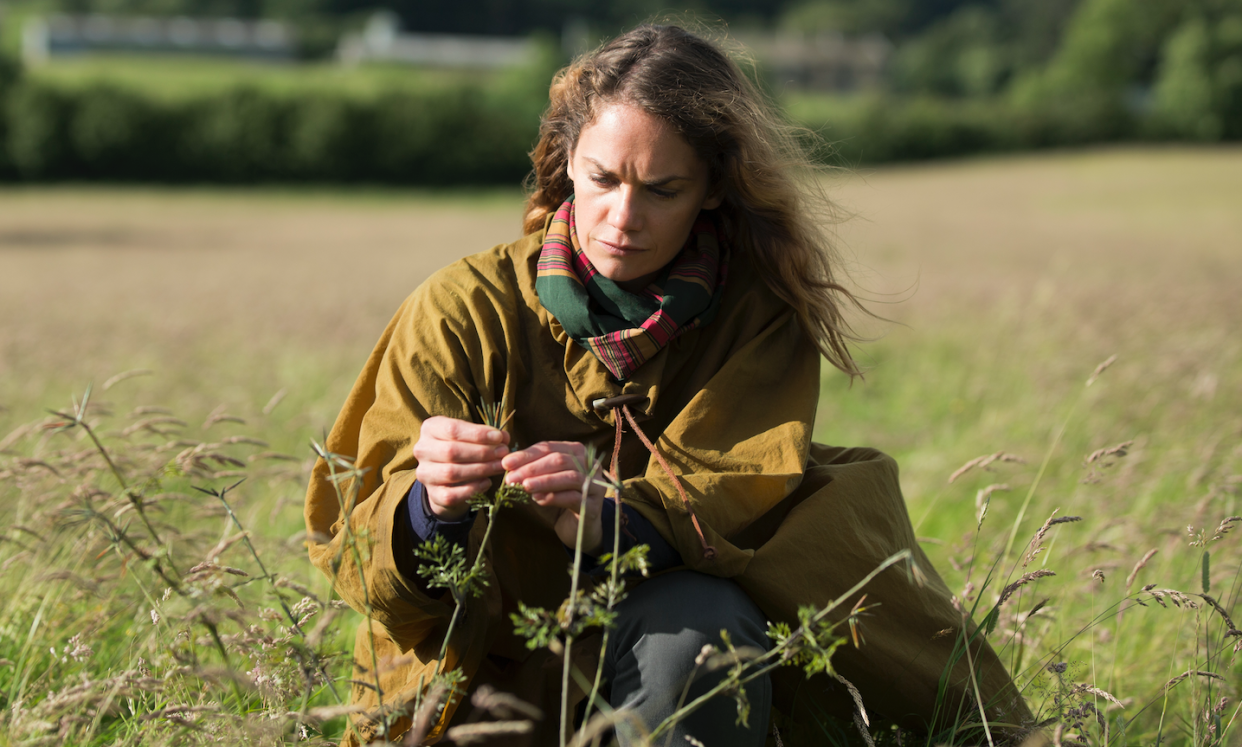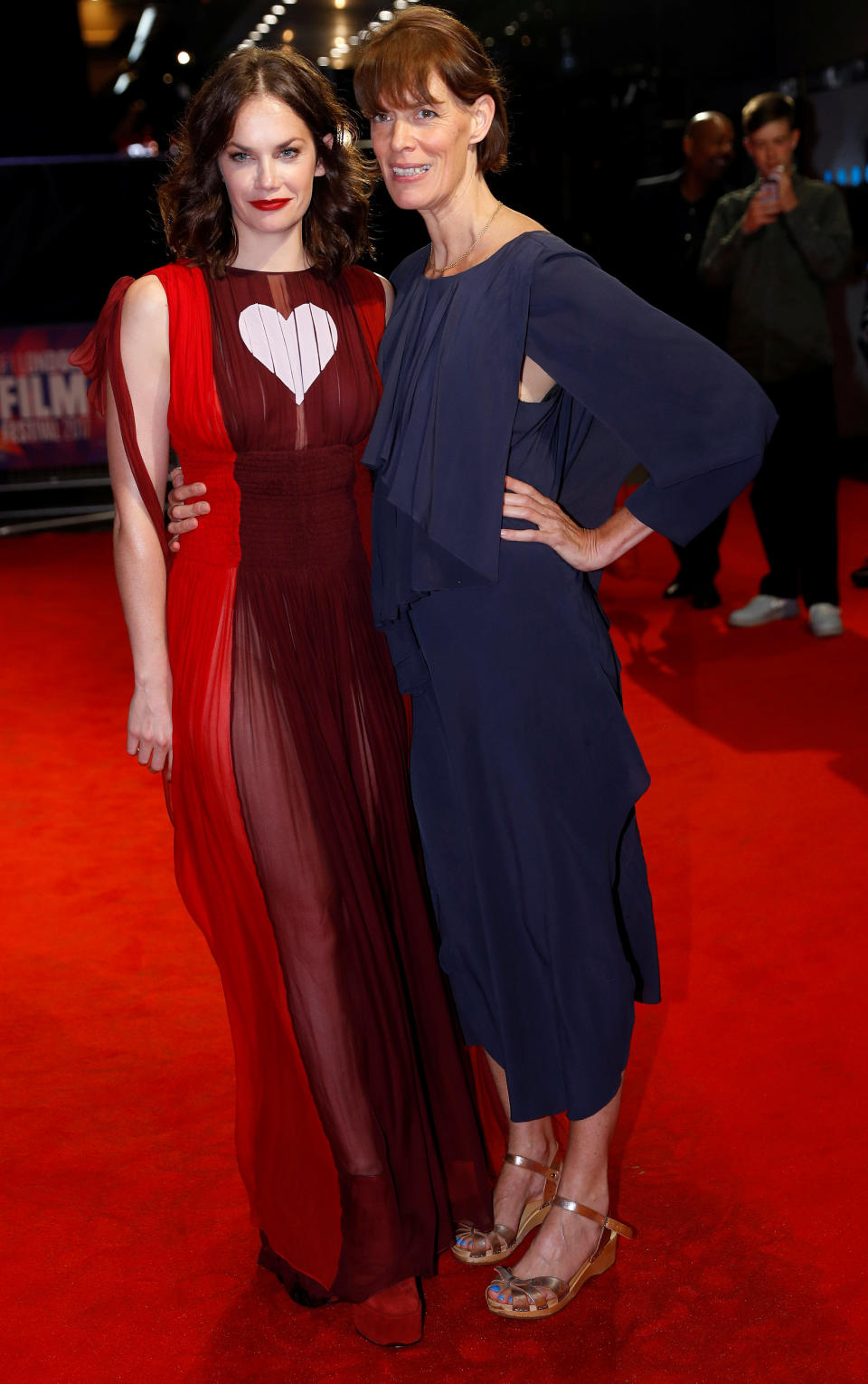Ruth Wilson on the BBC pay debate: 'Men are going to have to lower their wages' (exclusive)

Ruth Wilson is excited about the future. The BBC stalwart has led the call for equal pay for several years now, and, finally, it feels like change might be about to happen. But the responsibility shouldn’t just rest on women’s shoulders. “Men have to be part of it too,” Wilson tells Yahoo.
“That’s the next phase, really. What are the BBC going to do? Raise everyone’s wages to match those who are getting paid the most? I don’t know if they are going be able to afford to do that, so men are going to have to lower their wages. They’re going to have to accept lower wages than they’ve been paid. Is that going to happen? I don’t know.”
In the UK, Ruth Wilson is a national treasure. Whether she’s treading the boards in acclaimed theatre productions, stealing scenes in telly shows such as Luther and The Affair, or alternating indie dramas with large-scale blockbusters at your local cinema, Wilson’s dedication to her craft never fails to impress.
So, we jumped at the opportunity to discuss Wilson’s latest film, Dark River, which follows Alice (Wilson) as she returns to her family farm after a long absence, following a bereavement. The film is a poetic take on some deeply intense themes – including an exploration of the kind of abuse of power currently being discussed within Hollywood.
Each movement Wilson makes in Dark River seems to convey the intense inner pain her character is experiencing; a performance choice that came from a detailed pre-production research period…

Yahoo Movies UK: I’d like to start by talking about body language, because it’s such a large part of this character. How did you develop that?
Ruth Wilson: I’m quite physical as an actor, from doing a lot of stage work. It just comes naturally to me to think of a character’s physicality, or how their inner life is represented in their physicality. With her, I did a lot of research with therapists and people who had gone through that sort of abuse, and asked them very specific questions about how they feel.
One woman said “I feel brittle, I feel like my bones are all brittle and they could snap at any moment.” So that gave me an idea of how [Alice] was feeling inside, she’s holding this trauma – that’s what it’s making her feel like.
Also, you pick up things when you’re researching, You get clues. Something suddenly connects the dots. I was working with sheepdogs, because I was doing sheep-herding skills, and there was this one dog there, she was a red-haired collie, she had greeny-blue eyes, and she wouldn’t look you in the eye, she was very skittish.
She looked like she’d been traumatised by humans, she’d be very jumpy if they came near her. But when she was on the field with the sheep, she was focused, she was on them, she was completely in control.

So that felt really interesting, that this dog seemed deeply traumatised, but on the field she was in charge. I got my physicalisation from that dog, actually. She doesn’t trust humans, she’s scared of them, but she’s really at one with nature, and she knows how to deal with certain things – that’s how she gets her control.
In terms of the difference between film and theatre, the camera basically looks into your soul, it’s hard to hide the truth from it – what’s your relationship with the camera like?
It’s been an interesting relationship with me, because I don’t like being watched that closely, most people won’t like being watched that closely. Some actors do like it, and you can see a difference between actors who do and don’t. Both performances can be extraordinary, but they’re different.
Someone like Joaquin Phoenix maybe doesn’t like being watched that closely, but he’s forever interesting because of that slight awkward relationship with the camera – I’m speculating – but someone like Ryan Gosling or Jennifer Lawrence like being watched, they have a real ease with being watched. Some people don’t, but it’s still interesting.
I have a bit of both, there’s a sweet spot you can find with the camera, where you can feel the energy – feel like you’re giving it [something] or not, and you can play with what you show and what you don’t. I still feel I’m learning that stuff, it’s something I have to overcome every time I do a job, really.
Stage for me is more physical, and it’s a different relationship with an audience. Being watched that closely is hard – you might not want the camera to be that close to you, it’s quite intrusive.

The film’s very timely, there’s a lot about abuse and abuse of power in the news at the moment. You’ve been talking about equality of pay for a long time, do you think that if pay was more equal, there’d be less abuse of power?
I’ve just been reading Virginia Woolf’s A Room Of One’s Own, and it’s a fascinating book for now. [It’s] her exploration of the history of women, and how it’s all been written by men – it’s their opinion of what women are – and how women don’t have economic power, and are therefore are constantly treated as lesser beings, or subhuman, or inferior.
I do think if you have an ability to live by your own means, then you have power and you have freedom. I’m 36, I don’t have a kid – I’m not going to go off and get pregnant, it’s not an issue – so why am I getting paid less? That’s what lots of employers might say ‘You might go off and leave us for six months’ – it’s such a null and void argument, it doesn’t make any sense.

The patriarchy is systemic in the way we’re all brought up, and we’re all complicit in that patriarchy, which means we’re constantly keeping ourselves below our value, and letting ourselves be treated in that way.
It’s pay, but it’s also in objectification of women generally. Our job isn’t just to act, it’s to walk down the carpet in an outfit, be competing with other women on the carpet with an outfit. It’s so devaluing, because instantly it’s not about the work, it’s about what outfit you’re wearing. But we all do it, because we feel we have to, to keep up. The whole world works around that, it makes it very hard not to be part of that system.
It really feels like the system is certainly starting to wobble – I’ve never seen anything like this…
No.
And I’m really glad it’s continuing…
Snowballing, yeah.
…Because sometimes the worry is that the media will throw its attention onto an issue, because it’s current, and then they move on and it’s like that thing never happened, but this seems to be perpetuating.
I felt the same. I was in LA when it broke about Harvey, I was filming at the time, and everyone was talking about it. It felt like a real watershed moment. But Christmas was coming, and people were wondering if it would continue after Christmas. But what’s amazing is it’s not just in our industry, it’s exposing itself – the lid has been lifted on lots of areas and women are feeling empowered to speak.
The gymnasts… it gives me goosebumps every time I think of those girls getting up, speaking their mind and having a voice. Then you see the BBC and the journalists arguing for equal pay… It’s brilliant, the consequences of this are still being felt and women everywhere are thinking they don’t want this to go.
And men have to be part of it too. That’s the next phase, really. What are the BBC going to do? Raise everyone’s wages to match those who are getting paid the most? I don’t know if they are going be able to afford to do that, so men are going to have to lower their wages. They’re going to have to accept lower wages than they’ve been paid. Is that going to happen? I don’t know.
I do not understand why there’s an assumption that women should get paid less, I do not understand that as a principle, it doesn’t make sense to me. And yet, we all accept it.

Dark River’s directed by Clio Barnard, can you talk about working with her?
I love Clio, I think her work is completely unique, she’s a true lover of human beings I think. She really delves into the complexities of communities and the people whose stories don’t get told. I wanted to work with her, I loved The Arbor, so I read the script and it was a no-brainer really. The material was very sparse on the page, but it was very poetic and I could feel how she’d bring her influence in there, how she was going to visualise that.
Yeah, there’s a long time before there’s any dialogue, isn’t there?
Twenty minutes before I speak! So I knew that the land was going to be very important, and Mark and I being at one with the land was going to be vital. Also, Clio demands truth, so I think both Mark and I were very nervous, she demands something – her work demands truth. So we both felt pressured to get there, to give her what she wanted. She does have that amazing power that everyone wants to work hard for her.
What is that quality, do you think? What makes her different?
It’s grace, it’s compassion, it’s intelligence, she has such sensitivity to everyone – to characters, story, actors, crewmembers, the people who she talks to, who’s she’s basing this on… Everyone she talks to, she has great compassion for and wants to understand what they’re trying to get at. It’s deeply thoughtful. Because she cares so deeply, you want to do her justice.
Dark River is in UK cinemas on 23 February.
Read more
Luther series 5 starts filming and fans are worried about one BIG change
Luke Wilson hailed ‘a hero’ for pulling woman to safety from fatal car crash
Natalie Portman says she was ‘unaware’ of whitewashing in new movie Annihilation

 Yahoo Movies
Yahoo Movies 

